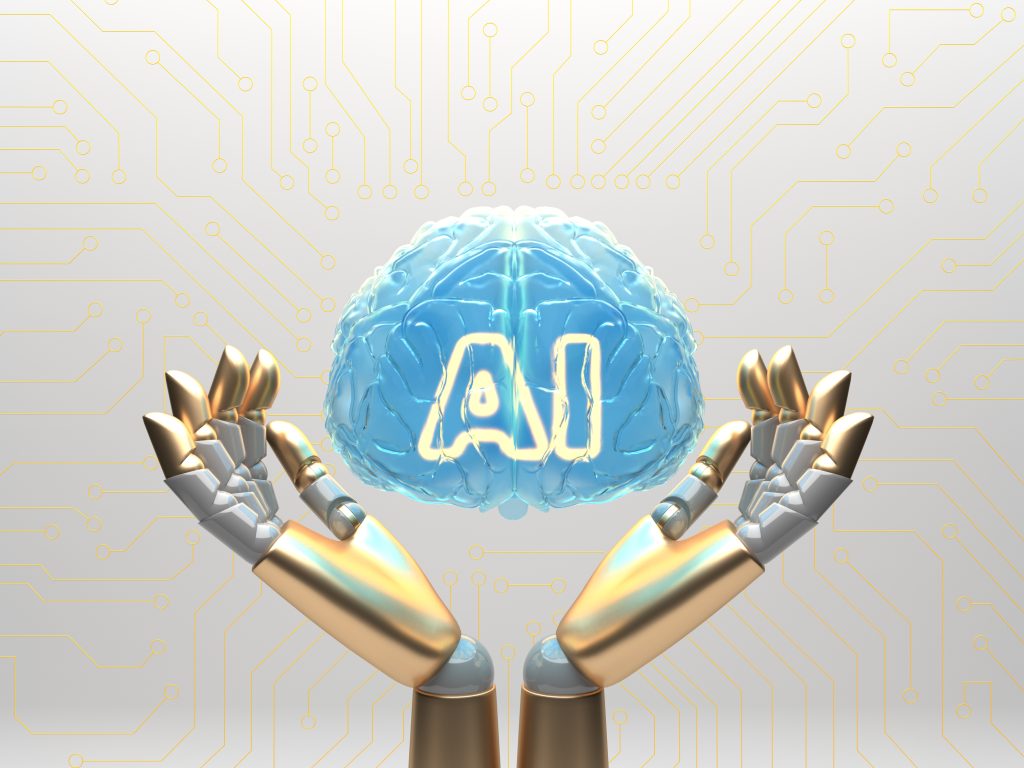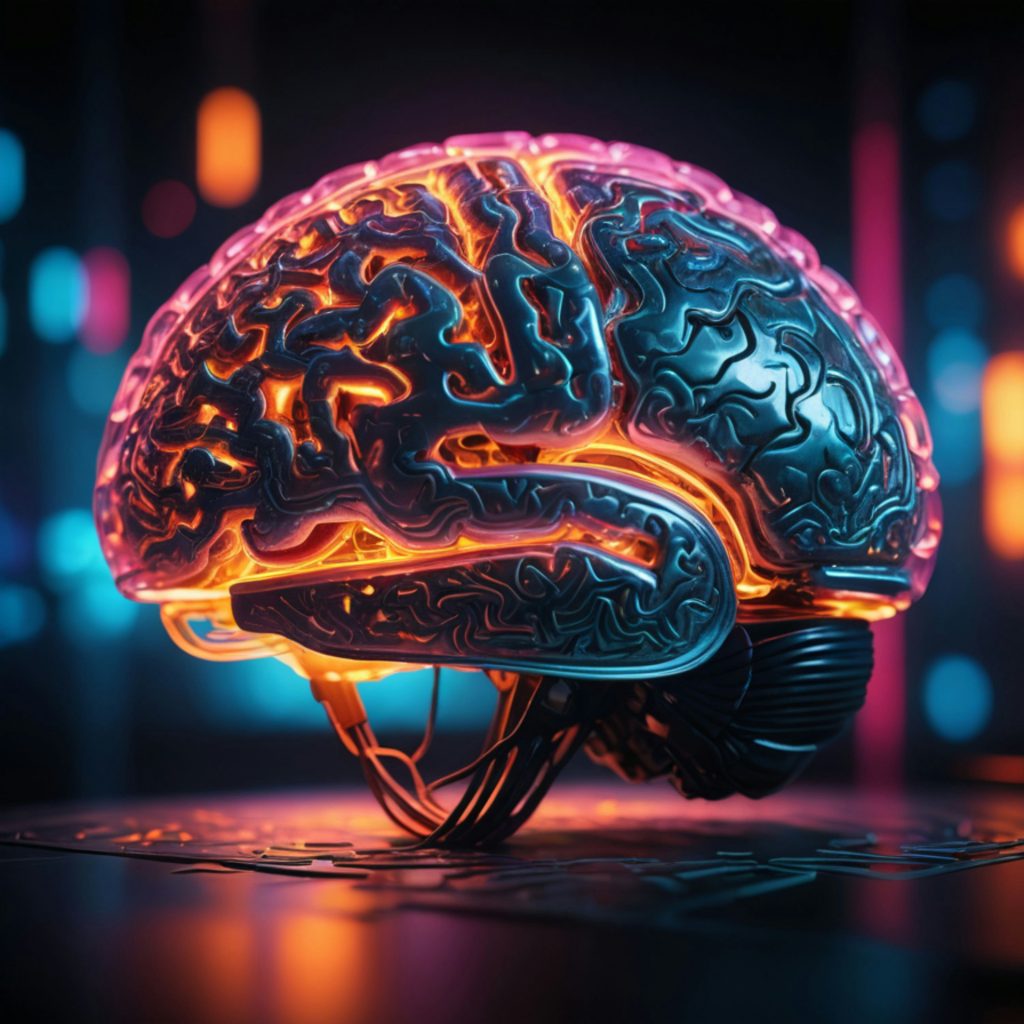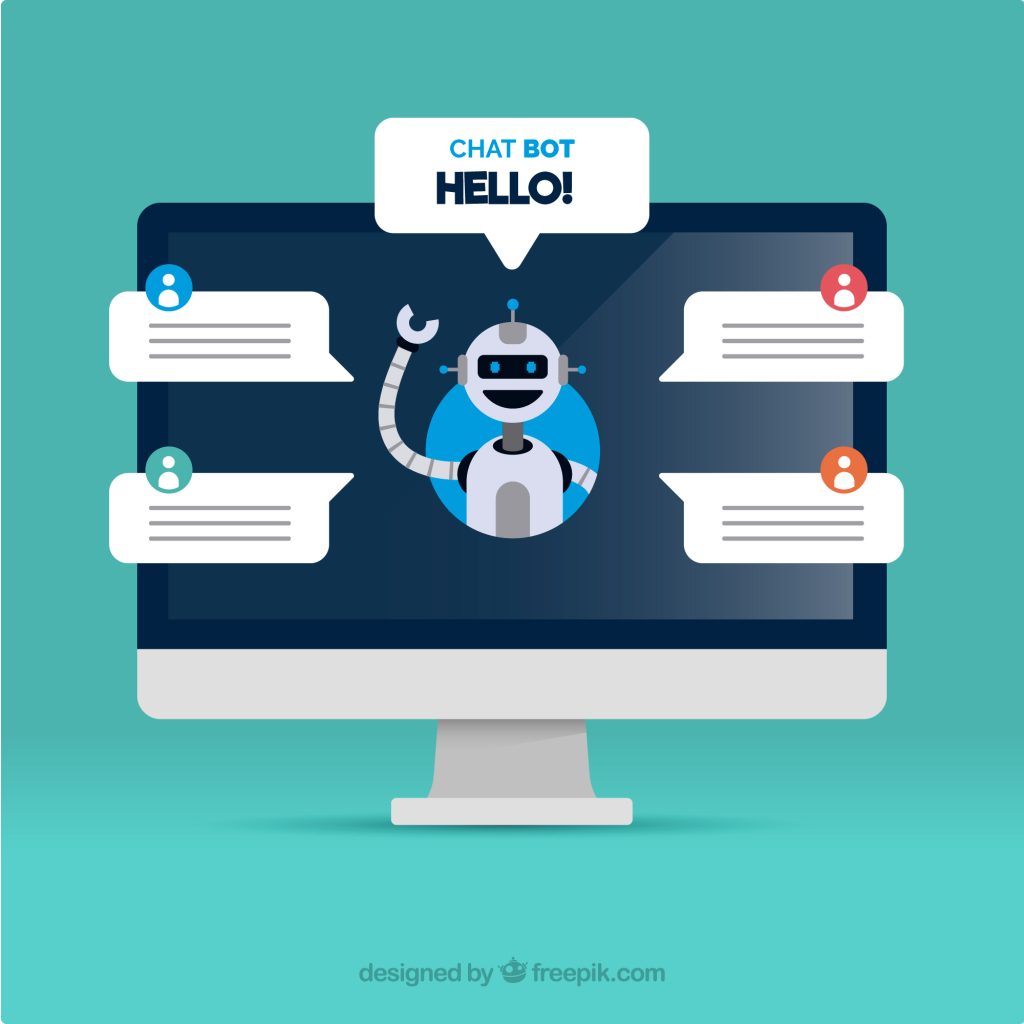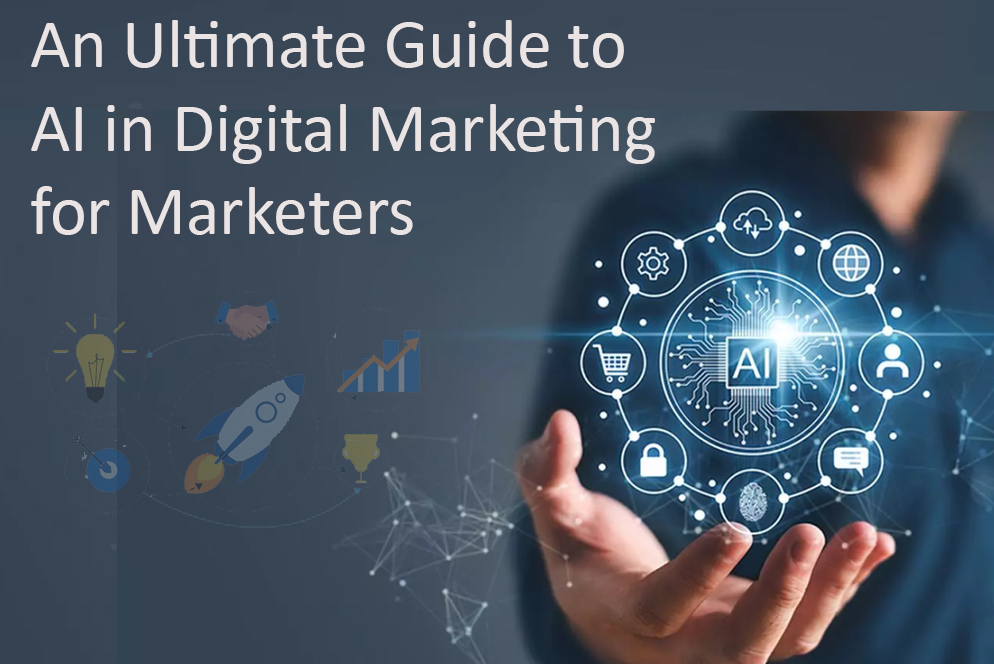An Ultimate Guide to AI in Digital Marketing for Marketers
Introduction
As technology evolves, Artificial Intelligence (AI) has begun to touch every aspect of our lives, transforming industries and reshaping how we interact with the world. AI is becoming ubiquitous, from smart assistants in our homes to sophisticated algorithms driving marketing strategies. Consider this:
- Enhanced Productivity: AI can manage repetitive tasks, allowing individuals to focus on creativity.
- Personalization: Tailored experiences are delivered based on individual preferences.
In this article, we’ll explore the remarkable journey of AI in digital marketing and its impact.
- What is AI?
- How AI Works?
- History of AI Development
- What is Machine Learning?
- What is Neural Networks and Deep Learning?
- Natural Language Processing (NLP) Models
- Popular AI Models: 5 Examples
- How to Use AI Models
- What is AI in Digital Marketing?
- How Do Digital Marketers Use AI?
- Ways to Use AI in Digital Marketing
- How to Create an AI Digital Marketing Strategy
- How to Use ChatGPT at Work
- 9 Ways to Use AI in Digital Marketing
- Benefits, Challenges, and Considerations
- Data Privacy and Security Risks
- The Future of Artificial Intelligence in Digital Marketing
- Is AI Replacing Marketers?
- Conclusion
What is AI?

Artificial Intelligence, or AI, refers to the simulation of human intelligence in machines designed to think and learn like humans. It involves creating algorithms that enable computers to perform tasks that typically require human intelligence. Think about your daily encounters with AI:
- Virtual Assistants: Siri and Alexa help manage schedules and answer questions.
- Recommendation Systems: Netflix and Spotify tailor suggestions based on your preferences.
AI isn’t just data crunching; it’s about mirroring human-like understanding and behavior, bringing technology closer to how we think and react. This incredible capability allows businesses to innovate continuously.
How AI Works?
Understanding how AI works provides clarity on its impact on our lives. At its core, AI utilizes algorithms and data to interpret information and make decisions. Here’s a simple breakdown:
- Data Input: Collecting data from various sources.
- Processing: Analyzing data using machine learning algorithms.
- Output: Making predictions or suggestions based on learned patterns.
For instance, when you search for a particular product online, AI analyzes your search history and preferences, delivering tailored results. This adaptability is what makes AI revolutionary!
History of AI Development

The journey of AI development is as fascinating as the technology itself. Spanning decades, it has evolved from mere theoretical concepts to the powerful applications we rely on today. Key milestones include:
- Foundational Theories: Early ideas introduced by pioneers like Alan Turing.
- Breakthroughs in Computing: Advancements in hardware and algorithms enhancing AI capabilities.
Reflect on how AI’s rich history establishes the foundation for the innovative tools we use today. Each phase laid the groundwork for the AI advancements that shape various industries and our daily lives.
1950s: The Birth of AI
The 1950s marked a pivotal decade in the history of artificial intelligence, often referred to as the birth of AI. This period was characterized by groundbreaking theories and experiments that set the stage for future developments. Key highlights from this era include:
- Turing Test: Proposed by Alan Turing, this concept aimed to measure a machine’s ability to exhibit intelligent behavior indistinguishable from a human.
- First AI Programs: Early programs like the Logic Theorist and General Problem Solver showcased the potential of machines to perform tasks that typically required human intellect.
This decade sparked curiosity and ambition among scientists, significantly shaping the trajectory of AI exploration in the years to come.
1960s: Early Research and Development
Building on the foundations laid in the 1950s, the 1960s witnessed a surge in AI research and development. This decade focused on refining algorithms and exploring problem-solving methods, leading to significant advancements. Notable developments included:
- Natural Language Processing: Researchers began exploring ways for computers to understand human language, paving the path for future communication technologies.
- Perception and Robotics: Early attempts at creating machines that could interpret visual data and navigate their environments sparked interest in robotics.
This vibrant period ignited enthusiasm within the tech community, laying essential groundwork that would influence both academic research and real-world applications. The era’s innovative spirit continues to resonate in today’s advancements.
1980s: The Rise of Expert Systems
As the dust settled from the experimental enthusiasm of the 1960s and 70s, the 1980s heralded a new wave of practical applications with the rise of expert systems. These programs leveraged knowledge-based systems to emulate the decision-making capabilities of human experts in specialized fields. Core aspects of this era included:
- Knowledge Representation: Expert systems utilize rules and facts to simulate human reasoning in areas like medicine and finance.
- Commercial Applications: Companies began adopting these systems for operations, including diagnostics and troubleshooting.
The excitement surrounding expert systems not only showcased AI’s potential but also prompted businesses to reconsider how they approached problem-solving. This decade laid the groundwork for integrating AI into everyday organizational processes, which resonates in modern advancements today.
1990s: Machine Learning Emerges
Transitioning from expert systems, the 1990s marked a significant shift in AI evolution with the emergence of machine learning. This exciting development focused on enabling computers to learn from data rather than relying on pre-defined rules. Key highlights from this era included:
- Algorithms and Models: The introduction of algorithms like decision trees and neural networks enhanced predictive capabilities.
- Increased Data Availability: The growth of the internet resulted in a vast amount of data, facilitating more effective learning processes.
The 90s were a transformative period that positioned machine learning as a cornerstone of AI. This evolution paved the way for future innovations, fueling a broader scope of applications we see flourishing today. It was a decade that significantly expanded the horizons of artificial intelligence!
2000s: Big Data and AI Integration
The dawn of the 2000s ushered in an era defined by the integration of big data with artificial intelligence. As society became increasingly data-driven, AI systems capitalized on the vast amounts of information available, leading to groundbreaking innovations. Key developments from this decade include:
- Data Mining Techniques: Enhanced algorithms capable of extracting valuable insights from large datasets.
- Real-time Analytics: Businesses began leveraging AI to analyze data quickly, enabling more informed decision-making.
This period marked a pivotal turning point where AI’s capabilities expanded dramatically, allowing organizations to use data not just for reporting, but for predictive analysis and strategic initiatives. It truly set the stage for the AI advancements we continue to enjoy today!
2010s: Deep Learning and AI Everywhere
As the 2010s rolled in, deep learning emerged as a transformative force in the AI landscape. This subset of machine learning utilized neural networks with many layers to analyze vast amounts of data, enabling significant breakthroughs across various sectors. Highlights from this decade include:
- Computer Vision Advancements: AI systems began to interpret images and videos with remarkable accuracy, impacting fields like healthcare and automotive.
- Natural Language Processing: Technologies like chatbots and virtual assistants became commonplace, enhancing user experiences.
In this vibrant era, AI has become ubiquitous, making its way into everyday applications, from recommendation engines on Netflix to voice recognition systems on smartphones. The integration of deep learning not only enriched user interactions but also driven innovation across numerous industries.
2020s: AI in Everyday Life
As we venture into the 2020s, AI has seamlessly integrated itself into the fabric of everyday life. From smart home devices to advanced personal assistants, its presence is more profound than ever. Noteworthy trends this decade include:
- Smart Homes: Devices like smart thermostats and security systems learn user preferences to enhance convenience and security.
- Health Monitoring: Wearable technology leverages AI to track health metrics and provide personalized recommendations.
This era illustrates how AI not only enhances efficiency but also enriches our day-to-day experiences, enabling individuals to lead healthier and more connected lives. The destination for AI is not just innovation, but the creation of smarter, more intuitive environments for everyone!
What is Machine Learning?

Building upon the foundations of AI, machine learning (ML) is a crucial subset that enables computers to learn from data without explicit programming. This learning process allows systems to improve their performance over time based on the information they analyze. Key features of machine learning include:
- Data-Driven: ML relies on vast amounts of data to detect patterns and make predictions.
- Adaptability: As more data is fed into the system, it becomes increasingly accurate and efficient.
For example, when streaming your favorite music, ML algorithms analyze your listening habits to suggest similar songs that you might enjoy. This remarkable capacity to learn from experience is what sets machine learning apart, fueling the advancement of intelligent technologies that enhance our daily lives.
What is Neural Networks and Deep Learning?

Diving deeper into machine learning, neural networks and deep learning are transformative techniques that mimic the human brain’s structure and function. These methods enable computers to recognize patterns and make decisions in a way that resembles human cognition. Key aspects include:
- Neural Networks: Composed of layers of interconnected nodes (or neurons) that process data in stages, allowing complex computations.
- Deep Learning: A subset of neural networks with many layers that performs exceptionally well on tasks like image and speech recognition.
For instance, think about how photo apps can tag friends in pictures. Deep learning algorithms analyze countless images, learning to distinguish faces with incredible accuracy. This technology showcases the power of neural networks, revolutionizing how we interact with data across various domains!
Natural Language Processing (NLP) Models
Following our exploration of neural networks and deep learning, we arrive at Natural Language Processing (NLP)—a fascinating area where AI interacts with human language. NLP models enable machines to understand, interpret, and respond to text or voice data in a human-like manner. Key characteristics of NLP include:
- Text Analysis: NLP can dissect and comprehend the structure and meaning of written language.
- Sentiment Recognition: These models can evaluate the emotional tone behind words, providing insight into user feelings.
For example, chatbots use NLP to engage with customers effectively, answering queries and providing support. This remarkable ability to understand context and nuances in language demonstrates the power of NLP, making human-computer interactions smoother and more intuitive than ever!
Popular AI Models: 5 ExamplesNow that we’ve delved into the nuances of Natural Language Processing, let’s explore some popular AI models that are making waves across various industries. These models exemplify the versatility and power of AI technology. Here are five notable examples:
- GPT-4: A groundbreaking language model that generates human-like text and powers chatbots and content creation tools.
- BERT: Developed by Google, this model excels in understanding the context of words in a sentence, enhancing search engine accuracy.
- DALL-E 2: An innovative model that creates images from textual descriptions, showcasing AI’s creative capabilities.
- DeepMind’s AlphaGo: A pioneering model that defeated human champions in the complex game of Go, demonstrating strategic reasoning.
- IBM Watson: This cognitive computing platform analyzes large datasets to support decision-making in healthcare and business.
These models highlight the rapid advancement of AI, showing how technology continues to enhance our ability to process information and create solutions in dynamic environments!
GPT-4

As one of the most advanced AI language models available today, GPT-4 represents a significant leap in AI technology. Building on the success of its predecessors, it offers enhanced capabilities for generating text that feels remarkably human-like. Key features of GPT-4 include:
- Contextual Understanding: It can grasp nuanced contexts, allowing for more relevant and coherent responses.
- Wide Range of Applications: From content creation and tutoring to coding assistance, its uses are impressively diverse.
For example, many educators now use GPT-4 to help generate personalized learning materials, adapting to each student’s needs. This adaptability showcases how GPT-4 is not just a tool but a partner in creativity and problem-solving, reshaping our interactions with technology in exciting ways!
Gemini

Following the advancements of GPT-4, Google has made waves in the AI landscape with its Gemini model. Designed to be versatile and powerful, Gemini combines multiple AI technologies to enhance performance in various tasks. Key features of Gemini include:
- Multimodal Capabilities: It can process and generate text, images, and even video, making it a true powerhouse in content creation.
- Enhanced Integration: Gemini is designed to seamlessly integrate with existing Google services, improving user experiences across platforms.
For instance, users can leverage Gemini to create interactive presentations, effortlessly incorporating relevant images and text recommendations. This ability to merge different content types highlights Gemini’s innovative approach, setting a new standard in AI technology and elevating productivity to unprecedented levels!
Claude

Hot on the heels of models like Gemini, Claude has emerged as another formidable player in the AI landscape. Developed by Anthropic, Claude is designed with a focus on safety and effective user interaction, making it a unique addition to the realm of AI assistants. Key highlights of Claude include:
- Safety-Centric Design: Claude emphasizes ethical AI use, aiming to reduce harmful outputs and enhance user trust.
- Collaborative Interactions: It fosters a conversational style that encourages engagement and feedback from users.
For example, many businesses are now using Claude to facilitate customer support, where its approach helps ensure positive interactions while addressing client queries effectively. This commitment to safety and collaboration showcases Claude’s potential to redefine how we engage with AI in our daily lives!
DALL-E 2

Following the innovative capabilities of Claude, DALL-E 2 takes creativity to the next level by generating stunning images from textual descriptions. Developed by OpenAI, this model showcases how AI can bridge the gap between language and visual art. Key features of DALL-E 2 include:
- Text-to-Image Generation: Users can input descriptive phrases, and DALL-E 2 creatively interprets them, producing unique visual outputs.
- Imaginative Variations: The model can create multiple interpretations of the same prompt, allowing for extensive artistic exploration.
For instance, artists and designers use DALL-E 2 for inspiration, generating concept art that enhances their creative process. This ability to transform words into vivid imagery emphasizes the model’s revolutionary impact, making art and design more accessible and exciting for everyone!
Agentic AI

Rounding out our exploration of popular AI models, Agentic AI represents a groundbreaking approach that enhances automation and decision-making capabilities. Designed to act independently, this model operates with a level of agency, enabling it to make choices based on learned behavior and real-time data. Key features of Agentic AI include:
- Autonomous Decision-Making: It can assess situations and make informed decisions without constant human intervention.
- Contextual Awareness: Agentic AI adapts to its environment, refining its actions based on previous outcomes.
For example, businesses are leveraging Agentic AI for supply chain management, where it predicts stock needs and adjusts orders automatically. This level of independence not only increases efficiency but also empowers organizations to operate more seamlessly in a fast-paced world. Agentic AI showcases the exciting potential of machines to learn and act intelligently, propelling us toward a more automated future!
How to Use AI Models
Now that we’ve examined various AI models, understanding how to effectively use these tools is vital for harnessing their potential. Whether for business, education, or creativity, integrating AI models can unlock new efficiencies and innovations. Here are some practical tips:
- Identify Your Needs: Clearly define the problem you want to solve or the task you want to enhance with AI.
- Choose the Right Model: Select an AI model that aligns with your requirements. For instance, use DALL-E 2 for image generation or GPT-4 for content creation.
- Experiment and Iterate: Start with small projects to gauge effectiveness and adjust based on feedback and results.
For example, a marketing team might use GPT-4 to generate blog ideas while adjusting prompts to refine outputs. By understanding how to leverage these models, users can maximize their capabilities, ensuring impactful results in various applications!
What is AI in Online Marketing?
Continuing from how to effectively use AI models, it’s essential to explore AI’s transformative role in online marketing. AI in this context refers to leveraging machine learning, data analytics, and automation to enhance marketing strategies and improve customer engagement. Key aspects of AI in online marketing include:
- Personalization: AI algorithms analyze customer behavior to tailor marketing messages, ensuring they resonate with individual preferences.
- Predictive Analytics: By examining historical data, AI can forecast trends and customer needs, helping businesses stay ahead of the game.
For instance, e-commerce platforms use AI to recommend products based on past purchases, thereby increasing sales and customer satisfaction. This integration of AI empowers marketers to create more effective campaigns, ultimately driving better results and a deeper connection with their target audience.
Which Type of AI is the Most Relevant for Online Marketing?
Building on our understanding of AI in online marketing, identifying the most relevant types of AI is crucial for achieving optimal results. Several AI techniques can significantly enhance marketing efforts, but a few stand out as particularly impactful. Key AI types for marketing include:
- Machine Learning: Used for analyzing consumer data and predicting behavior, helping digital professionals target their audience effectively.
- Natural Language Processing (NLP): Vital for chatbots and sentiment analysis, enabling brands to engage with customers personally and promptly.
For example, a brand utilizing machine learning can tailor its email campaigns based on customer interactions, leading to higher open and conversion rates. Recognizing these AI types empowers digital professionals to harness their full potential, creating strategies that resonate and drive engagement in an increasingly competitive landscape.
How Do Digital Marketers Use AI?

Having established which types of AI are most relevant for marketing, let’s dive into how digital professionals actively use AI to elevate their strategies. This technology provides a wealth of tools that streamline processes and enhance decision-making. Common applications of AI in online marketing include:
- Targeted Advertising: AI analyzes user data to deliver personalized ads to specific audiences, increasing engagement rates.
- Content Creation: Tools like GPT-4 assist in generating blog posts, social media content, and email campaigns, saving time and effort.
For instance, an online marketing team can employ AI to optimize their ad budgets by predicting the best-performing ad placements. By leveraging these AI capabilities, digital professionals can significantly improve their efficiency and effectiveness, ultimately leading to better campaign performance and higher ROI!
Define Your Goals
With a clear understanding of how digital strategists utilize AI, the next step is to define your goals. Establishing well-defined objectives creates a roadmap for your marketing initiatives and ensures that AI tools align with your vision. Here are some key considerations for goal-setting:
- Specificity: Be clear about what you want to achieve, whether it’s increasing brand awareness or boosting sales.
- Measurable Outcomes: Set quantifiable targets, such as a 20% increase in website traffic or a 15% growth in email open rates.
For example, a small business might aim to improve customer retention rates by using AI-driven personalization in their marketing campaigns. By articulating clear and measurable goals, digital strategists can leverage AI effectively, ensuring their strategies lead to impactful results and meaningful growth!
Audit Your Infrastructure
Once you’ve defined your marketing goals, the next crucial step is to audit your infrastructure. This process ensures that your systems, tools, and data sources are ready to support your AI initiatives effectively. Consider these key elements during your audit:
- Data Quality: Assess the accuracy and completeness of your existing data, as clean data is essential for AI success.
- Tools and Platforms: Evaluate your current marketing tools to determine if they integrate well with AI technologies.
For instance, a company using outdated software might find it challenging to implement new AI analytics tools. By performing a thorough audit, you can identify gaps or weaknesses in your infrastructure, ensuring it aligns with your goals and supports effective AI implementation for future marketing strategies!
Generative AI for Marketing
Building on the ways to use AI in web marketing, generative AI stands out as a revolutionary tool that creates content, images, and even videos tailored to specific needs. This technology can streamline the creative process and enhance marketing campaigns significantly. Key benefits of generative AI include:
- Content Creation: From blog posts to social media updates, generative AI can produce high-quality written content, saving time for digital strategists.
- Visual Design: AI models like DALL-E 2 can generate custom graphics based on textual descriptions, offering unique visuals for campaigns.
For instance, a brand planning a product launch could utilize generative AI to create engaging marketing materials rapidly. By leveraging generative AI, marketing teams can push creative boundaries, ensuring fresh and captivating content that resonates with their audiences while also maximizing efficiency!
The Power of Predictive Analytics
As we delve deeper into AI applications, one of the most transformative tools is predictive analytics. This powerful technique analyzes historical data to forecast future outcomes, empowering digital strategists to make informed decisions. Key aspects of predictive analytics include:
- Customer Insights: By understanding behaviors and patterns, businesses can tailor their strategies to meet evolving customer needs.
- Campaign Optimization: Predictive models identify the best times to launch campaigns, maximizing engagement and conversion rates.
For example, a retail brand might use predictive analytics to determine which products are likely to be popular in the upcoming season, allowing them to stock accordingly. By harnessing the power of predictive analytics, digital strategists can not only enhance operational efficiency but also create more targeted and successful marketing campaigns!
Using Generative and Predictive AI Together
Combining generative and predictive AI can create a powerful synergy in web marketing, leading to innovative strategies that enhance customer experience and business performance. When used together, these technologies allow for more dynamic, data-driven marketing efforts. Key benefits of this combination include:
- Targeted Content Creation: Predictive analytics can identify trending topics or customer preferences, while generative AI creates tailored content that resonates with audiences.
- Adaptive Campaign Strategies: Digital Advertisers can predict customer responses to various marketing tactics, enabling generative AI to craft messages that are most likely to engage those customers.
For instance, a marketing team might analyze data to forecast which products will be popular, then use generative AI in AI marketing to create targeted advertisements and promotional materials for those items. By leveraging both types of AI in conjunction, businesses can maximize their marketing efforts, ensuring they deliver the right message to the right audience at the right time!
How to Create an AI Digital Marketing Strategy?

Now that we’ve explored the powerful combination of generative and predictive AI, it’s time to focus on crafting an effective AI online marketing strategy. This approach will ensure that your business leverages technology to enhance engagement and drive results. Here are essential steps to creating your strategy:
- Assess Your Current Marketing Efforts: Understand your strengths and weaknesses, evaluating how AI can fill gaps and improve processes.
- Set Clear Objectives: Define what you want to achieve with your AI strategy, whether it’s increasing sales, enhancing customer experience, or improving brand awareness.
- Choose the Right Tools: Select AI tools that align with your goals, such as predictive analytics for insights or generative AI for content creation.
For example, a business aiming to boost customer retention may implement AI-driven personalization to tailor communications to individual user preferences. By following these steps, you’ll be well-equipped to build an AI-driven strategy that elevates your marketing efforts and drives sustainable growth!
5 Steps to Implement an AI Online Marketing Strategy Successfully
Having laid the groundwork for your AI online marketing strategy, it’s time to explore the steps necessary for a successful implementation. These steps will help ensure that your strategy is not only effective but also sustainable in the long term. Here are five essential steps to follow:
- Team Training: Equip your team with the necessary skills to harness AI technologies effectively; consider workshops or online courses.
- Data Management: Ensure you have reliable and clean data sources, as the quality of data directly impacts AI results.
- Pilot Programs: Start with small-scale AI initiatives to test effectiveness before rolling out large campaigns across your organization.
- Monitor and Adjust: Continuously track performance metrics and customer feedback, adjusting your strategy based on data insights.
- Scale Up: Once the pilot programs prove successful, gradually expand your artificial intelligence initiatives to broader marketing efforts.
For instance, a retail brand may launch a small AI-driven email campaign, analyze customer engagement, and then scale it up to include personalized recommendations based on browsing history. Following these steps will facilitate a smooth and effective implementation of your AI web marketing strategy!
How to Use ChatGPT at Work
As you begin implementing your AI web marketing strategy, utilizing tools like ChatGPT can significantly enhance productivity and creativity in the workplace. This versatile AI model can assist with a variety of tasks, making it a valuable asset for teams. Here are effective ways to leverage ChatGPT at work:
- Content Generation: Use ChatGPT to draft articles for content marketing, social media posts, or email newsletters, saving you time on content creation.
- Brainstorming Ideas: Engage with ChatGPT for fresh ideas while brainstorming marketing campaigns, product names, or promotional strategies.
- Customer Support: Implement ChatGPT in chatbots to provide instant responses to common customer inquiries, improving service efficiency.
For example, a marketer might ask ChatGPT for engaging headlines for an upcoming campaign, quickly generating several creative options. By integrating ChatGPT into your workflow, you can enhance team collaboration, streamline operations, and ultimately create a more dynamic marketing environment!
9 Ways to Use AI in Digital Marketing
With the foundational knowledge of ChatGPT and its applications, let’s explore nine impactful ways to integrate AI into your web marketing efforts. Each method can significantly enhance engagement and streamline operations. Here are nine effective uses of AI in online marketing:
- Personalized Marketing: AI analyzes customer data to tailor marketing messages, ensuring they resonate with each individual.
- Predictive Analytics: Anticipate customer behavior and preferences, helping optimize campaign strategies in advance.
- Chatbots: Provide real-time customer support, answering queries 24/7 and improving customer satisfaction.
- Dynamic Pricing: Adjust prices based on demand, competition, and customer behavior to maximize sales.
- Content Creation: Automate the generation of articles, social media posts, and personalized emails with AI assistance.
- SEO Enhancement: Utilize AI tools to analyze keywords and optimize content for better search visibility.
- Sentiment Analysis: Monitor customer feedback and social media to gauge public perception and adjust strategies accordingly.
- Ad Optimization: Automatically optimize ad placements and spending to increase conversion rates.
- Visual Recognition: Use AI to analyze images and videos, enabling better product recommendations or ad targeting.
For instance, a fashion retailer might employ AI to analyze customer trends and generate product recommendations, enhancing the shopping experience. By embracing these varied applications of AI, businesses can create more effective and tailored marketing strategies that resonate with their audiences!
Content Creation with AI

Transitioning from the diverse applications of AI in web marketing, one of the most exciting advancements is AI’s role in content creation. Harnessing AI tools can accelerate the brainstorming process and produce high-quality AI content efficiently, allowing digital advertisers to focus on strategy and creativity. Here are some ways AI enhances content creation:
- Automated Writing: Tools like GPT-4 can generate blog posts, articles, and social media content, reducing writing time significantly.
- Idea Generation: AI can brainstorm topics and headlines based on current trends and user interest, sparking new creative avenues.
- Editing and Proofreading: AI-powered grammar and style checkers help polish content, ensuring clarity and professionalism.
For instance, a marketing team may use AI to produce various drafts for a new campaign, allowing them to refine their messaging and present engaging narratives faster. By integrating AI into the content creation process, businesses can improve efficiency and maintain high standards while consistently delivering valuable content to their audience!
Customer Acquisition
Following our exploration of AI’s role in content creation, let’s delve into how AI can significantly enhance customer acquisition strategies. By leveraging AI-driven insights and tools, businesses can identify and target potential customers more effectively, leading to increased conversion rates. Here are some key ways AI supports customer acquisition:
- Targeted Advertising: AI analyzes consumer behavior to help businesses create highly targeted ad campaigns tailored to specific demographics.
- Lead Scoring: AI models can evaluate and prioritize leads based on their likelihood to convert, allowing sales teams to focus on the highest potential opportunities.
- Personalized Experiences: AI can track customer interactions, enabling companies to deliver personalized content and offers that resonate with individual preferences.
For instance, a software company uses AI to score leads based on past engagement, ensuring their sales team focuses on the most promising prospects. By harnessing AI for customer acquisition, organizations can streamline their processes and foster more meaningful connections with potential clients!
Audience Segmentation and Engagement

Building on the strategies for customer acquisition, another powerful application of AI in online marketing is audience segmentation and engagement. By understanding your audience better, you can tailor your messaging to improve the effectiveness of your marketing efforts. Here’s how AI enhances audience segmentation and engagement:
- Data Analysis: AI analyzes customer data from various sources to identify distinct segments based on behavior, preferences, and demographics.
- Dynamic Targeting: With real-time insights, AI can adjust campaigns to focus on specific audience segments, ensuring the right message reaches the right people.
- Enhanced Engagement: AI-driven tools can personalize communications, creating tailored content that speaks directly to individual interests.
For instance, an e-commerce platform might segment its audience based on purchasing habits, sending targeted promotions to different groups. By effectively utilizing AI for audience segmentation and engagement, businesses can foster stronger connections with customers, resulting in higher retention rates and improved overall satisfaction!
Data Collection and Analysis
Continuing from the importance of audience segmentation and engagement, effective data collection and analysis are foundational to successful AI-driven marketing strategies. By gathering and interpreting valuable data, businesses can make informed decisions that drive growth. Here’s how AI empowers data collection and analysis:
- Automated Data Gathering: AI tools can efficiently collect data from multiple sources, including social media, websites, and customer feedback.
- Advanced Analytics: Machine learning algorithms analyze complex datasets to uncover trends and insights that may not be immediately apparent.
- Real-time Reporting: AI can provide instantaneous insights, allowing professional digital advertisers to adjust strategies promptly based on current performance.
For example, a travel agency uses AI to collect customer preferences and behaviors from online interactions, informing personalized travel package recommendations. By integrating AI into data collection and analysis, businesses can unlock critical insights that enhance decision-making and ultimately lead to more effective marketing campaigns!
Customer Personalization
Following the insights derived from data collection and analysis, customer personalization emerges as a key driver in enhancing user experiences and boosting engagement. By tailoring interactions to individual preferences, businesses can create meaningful connections with their customers. Here’s how AI facilitates effective customer personalization:
- Tailored Recommendations: AI algorithms analyze past behavior to suggest products or services that align with each customer’s interests.
- Customized Content: By providing personalized content—such as targeted emails or exclusive offers—companies can significantly enhance user engagement.
- Real-time Adaptation: AI systems can adjust recommendations and content in real-time based on current user activity.
For example, a streaming service leveraging AI might recommend new shows based on viewing history, leading to increased watch time and customer satisfaction. By embracing customer personalization through AI, organizations can foster loyalty and drive long-term success in their marketing strategies!
SEO Campaign

Building on the importance of customer personalization, an effective SEO campaign is crucial for enhancing online visibility and driving traffic to your website. By leveraging AI in your SEO efforts, you can optimize your strategies to reach a broader audience more effectively. Here are key components of an AI-driven SEO campaign:
- Keyword Analysis: AI tools can identify trending keywords and phrases, helping you optimize content for search engines based on user intent.
- Content Optimization: AI analyzes existing content to suggest improvements, such as better headlines or keyword placement, enhancing search rankings.
- Performance Tracking: Continuous monitoring of website performance through AI provides insights on what works, allowing for quick adjustments in strategy.
For instance, a blog focused on health and wellness may employ AI to analyze reader engagement data, adjusting posts to focus on trending topics. By integrating AI into your SEO campaign, you can ensure your content remains relevant, ultimately improving visibility and attracting more visitors!
Knowledge Base Chatbot & Support

Transitioning from SEO campaigns, integrating a knowledge base chatbot into your customer support strategy can significantly enhance user experience. These AI-driven chatbots provide immediate assistance and accurate information, streamlining the support process for both customers and businesses. Here’s how knowledge-base chatbots improve support:
- 24/7 Availability: Chatbots provide instant responses to customer inquiries, ensuring assistance is available around the clock.
- Resource Efficiency: By handling common queries, chatbots free up human agents to focus on complex issues, improving overall efficiency.
- Consistent Information: Chatbots pull data from a centralized knowledge base, ensuring that customers receive accurate and consistent answers.
For example, an online retail store might implement a chatbot to assist customers with order tracking and return processes. By leveraging knowledge-based chatbots, businesses can not only enhance their support services but also foster customer satisfaction and loyalty through timely, reliable assistance!
Social Media Marketing and Management

Following the discussion on knowledge-based chatbots, let’s explore how AI can revolutionize social media marketing. With countless platforms and vast amounts of content, AI tools can streamline processes and enhance engagement, making social media efforts more effective. Here are the key benefits of using AI in social media marketing:
- Content Scheduling: AI can analyze audience activity data to determine optimal posting times, ensuring maximum engagement.
- Sentiment Analysis: By monitoring social media conversations, AI helps brands understand public perception and adjust strategies accordingly.
- Automated Responses: AI-powered tools can handle common inquiries, allowing brands to maintain responsiveness without overwhelming human teams.
For example, a restaurant uses AI to monitor user reviews and respond to customer feedback promptly on social platforms. By integrating AI into social media marketing, businesses can enhance their online presence, engage with audiences more effectively, and respond to trends in real-time, ultimately driving brand loyalty!
Image Creation with AI
Continuing from the advantages of social media management, AI-driven image creation is transforming how brands visually communicate. By harnessing advanced algorithms, businesses can produce stunning visuals quickly, aligning with their marketing strategies. Here’s how AI enhances image creation:
- Rapid Generation: AI can help to create unique images from textual descriptions, vastly reducing the time spent on design.
- Customization Options: Users can tweak elements like style and color to match brand aesthetics or campaign themes.
- Content Variety: AI can generate multiple variations of an image, providing marketing teams with diverse options to choose from.
For instance, a fashion brand uses AI to create eye-catching visuals for social media advertisements based on current trends. By integrating AI image creation into their marketing toolkit, businesses can streamline content production while ensuring their visuals remain captivating and relevant to their audience!
PPC Advertising

Building on the innovations in AI image creation, pay-per-click (PPC) advertising or digital ads is another area where AI excels, optimizing campaigns for better performance and higher ROI. By utilizing AI-driven tools, marketing professionals can enhance targeting and ad management strategies seamlessly. Here are the key advantages of AI in Google ads advertising:
- Automated Bidding: These algorithms analyze competition and user behavior, adjusting bids in real-time to optimize ad placements and costs.
- Audience Targeting: AI identifies and segments audiences based on demographics and interests, ensuring ads reach the most relevant potential customers.
- Performance Analysis: AI tools provide insights into ad performance, facilitating quick adjustments to improve results.
For example, an online retailer uses AI-driven PPC tools to automate their bidding strategy and refine their audience targeting, resulting in reduced ad costs and increased sales. By harnessing AI in PPC advertising, businesses can maximize efficiency and effectiveness, driving more qualified traffic to their sites!
Email Marketing

Following the advancements in PPC advertising, email marketing remains a powerhouse for engaging customers, and incorporating AI can take your efforts to new heights. By leveraging AI technologies, businesses can create more personalized and effective email campaigns that resonate with their audience. Here’s how AI enhances email marketing:
- Personalization: AI analyzes user data to tailor email content, subject lines, and sending times based on individual preferences.
- Automated Segmentation: AI can efficiently segment email lists, ensuring that the right messages reach the right audiences at the most opportune moments.
- Performance Optimization: AI tools track open rates and engagement, providing insights to refine future campaigns for better results.
For instance, an e-commerce store may use AI to send personalized product recommendations via email based on previous purchases, significantly increasing conversion rates. By integrating AI into email marketing strategies, businesses can foster closer relationships with customers while maximizing engagement and sales!
AI Online Marketing Best Practices
With a solid foundation in AI applications for web marketing, it’s essential to explore best practices to maximize your web marketing efforts effectively. Implementing these strategies can enhance user experience, drive engagement, and improve campaign outcomes. Here are key AI web marketing best practices:
- Integrate Across Channels: Ensure your AI tools work seamlessly across multiple marketing channels for a cohesive customer experience.
- Prioritize Data Quality: Maintain clean and accurate data to fuel your AI models, enabling better insights and outcomes.
- Test and Optimize: Regularly test different strategies with AI-driven insights, adjusting campaigns based on performance metrics and feedback.
For instance, a retail brand uses AI to analyze customer data across social media and email, ensuring consistent messaging and personalized offers. By following these best practices, businesses can harness the full potential of AI in their online marketing strategies, driving growth and customer satisfaction!
Benefits, Challenges, and Considerations

As we wrap up our exploration of AI in internet marketing, it’s important to weigh this transformative technology’s benefits, challenges, and key considerations. Understanding these factors will help guide your strategy and optimize outcomes effectively.
Pros of AI in Online Marketing
The advantages of integrating AI into online marketing are substantial. Understanding these pros can motivate businesses to adopt AI technologies more aggressively.
Key Advantages:
- Enhanced Targeting: AI analyzes vast data to identify and reach specific audience segments effectively.
- Improved Efficiency: Automation of repetitive tasks frees up time for teams to focus on strategy and creative solutions.
- Data-Driven Insights: AI provides actionable insights from data analysis, helping digital analysts make informed decisions quickly.
- Enhanced Personalization: Tailored customer experiences lead to higher engagement and loyalty.
For instance, a travel company utilizing AI can target ads based on user behavior and preferences, resulting in increased conversions. By harnessing these pros, businesses can significantly improve their internet marketing efforts, fostering better engagement and driving growth!
Cons of AI in Online Marketing
While the pros of AI in web marketing are compelling, it’s equally important to recognize the cons. Understanding these challenges allows businesses to prepare for potential pitfalls and make informed decisions about AI integration.
Key Disadvantages:
- High Implementation Costs: Setting up AI systems and infrastructure can be expensive and integrating AI tools can be daunting, requiring time and resources.
- Data Privacy Issues: Concerns over data security and compliance with regulations can complicate AI deployment.
- Dependence on Technology: Over-reliance on AI can lead to a loss of human touch in marketing, making interactions feel impersonal.
For example, a company that automates customer service may struggle to address complex queries that require empathy and nuanced understanding. By being aware of these cons, businesses can develop strategies to mitigate risks while still reaping the benefits of AI in their digital marketing efforts!
Challenges of AI in Online Marketing
As we dive deeper into AI in online marketing, it’s essential to address the various challenges that organizations may face when implementing this technology. Awareness of these challenges can prepare businesses to tackle them effectively.
Common Challenges:
- Data Quality and Integration: Poor data quality can hinder AI performance, as effective AI relies on accurate and comprehensive datasets.
- Skill Gap: Many teams may lack the necessary skills to implement and manage AI systems, leading to potential inefficiencies.
- Fast-Paced Evolution: The rapid development of AI technology can make it difficult for businesses to keep pace and remain competitive.
For instance, a small startup may struggle to train its staff on new AI tools, impacting its ability to leverage those technologies effectively. By acknowledging these challenges, businesses can develop strategies to overcome them and maximize the potential benefits of AI in their digital marketing initiatives!
Considerations of AI in Web Marketing
As we reflect on the challenges associated with AI in digital marketing, it’s vital to explore the considerations that organizations should keep in mind for successful implementation. By being proactive about these factors, businesses can enhance their AI strategies and outcomes.
Key Considerations:
- Ethical Implications: Ensure that AI usage respects customer privacy and addresses ethical concerns regarding data handling.
- Customer Experience: Focus on maintaining a balance between automation and personal interaction to enhance user satisfaction.
- Continuous Learning: Stay informed about AI advancements and regularly update strategies to harness new features and capabilities.
For example, a company that utilizes AI must also consider how its automated processes affect customer loyalty and trust. By thoughtfully addressing these considerations, businesses can effectively integrate AI into their Internet marketing strategies while fostering positive relationships with their audience!
Data Privacy and Security Risks for Using AI

As we navigate the considerations of AI in web marketing, one critical aspect that cannot be overlooked is the issue of data privacy and security risks. With the increasing reliance on data-driven strategies, businesses must prioritize safeguarding customer information to maintain trust and compliance.
Key Risks to Consider:
- Unauthorized Access: AI systems can be vulnerable to hacking, compromising sensitive customer data.
- Compliance Challenges: Keeping up with evolving regulations, like GDPR, can be daunting and costly.
- Data Misuse: Mismanagement of customer data can lead to breaches of trust and potential legal consequences.
For instance, a retail company that experiences a data breach not only faces financial repercussions but also risks losing customer loyalty. By actively addressing data privacy and security risks, businesses can protect both their customers and their reputations, paving the way for a successful AI implementation in their marketing strategies!
The Future of Artificial Intelligence in Digital Marketing
Continuing from the discussion on data privacy and security risks, it’s exciting to contemplate the future of artificial intelligence in online marketing. As technology evolves, AI is set to play an even more significant role in shaping marketing strategies and enhancing customer experiences.
Trends to Watch:
- Hyper-Personalization: AI will enable brands to deliver even more tailored experiences, using data to anticipate customer needs and preferences.
- Predictive Analytics Expansion: Advanced algorithms will improve the accuracy of predicting consumer behavior, allowing for proactive marketing strategies.
- Enhanced Automation: Expect to see increased automation in various marketing processes, optimizing efficiency and focusing human efforts on strategic creative tasks.
For example, businesses might soon leverage AI to create real-time personalized ads based on users’ social media activities. As AI continues to advance, digital analysts who embrace these changes will gain a competitive edge, paving the way for more innovative and effective web marketing strategies!
Is AI Replacing Digital Professionals?
As we explore the future of artificial intelligence in online marketing, a common concern arises: Is AI replacing marketers?
While AI undeniably transforms the industry, it complements rather than entirely replaces the human element.
Understanding the Balance:
- AI as a Tool: AI streamlines tasks and analyzes data but lacks the creativity and emotional intelligence that humans bring.
- Enhanced Collaboration: Marketers will increasingly become AI collaborators, using machine-generated insights to create more effective strategies.
- Focus on Strategy: With automation handling repetitive tasks, marketers can concentrate on high-level strategy and innovation.
For example, an online marketing team might rely on AI for data analysis but still craft unique campaigns that resonate emotionally with their audience. By viewing AI as a collaborative partner rather than a replacement, marketers can harness its power to enhance their work while maintaining the human touch that drives genuine connections with customers!
Conclusion
In conclusion, as we reflect on the role of artificial intelligence in digital marketing, it’s clear that AI is a powerful ally rather than a replacement for marketers. By understanding its capabilities, challenges, and ethical considerations, businesses can leverage AI to enhance strategies and foster deeper customer connections.
Key Takeaways:
- Embrace Collaboration: Use AI as a partner to complement human creativity and insight.
- Stay Informed: Keep up with the latest AI trends and tools to maximize their potential.
- Prioritize Ethics: Focus on ethical practices to ensure customer trust and compliance.
For instance, as marketing professional adapts to this evolving landscape, they can use AI-driven insights to craft compelling narratives that resonate with their target audience. By strategically integrating AI, businesses position themselves for success in a rapidly changing digital world. The future is bright for those willing to innovate and adapt!
If you find this article useful, please share it on social media. Please follow us on social media.
Author
Shahriar Ibne Azam, Sr. Digital Marketing Specialist
sazam@insightintechnology.com

